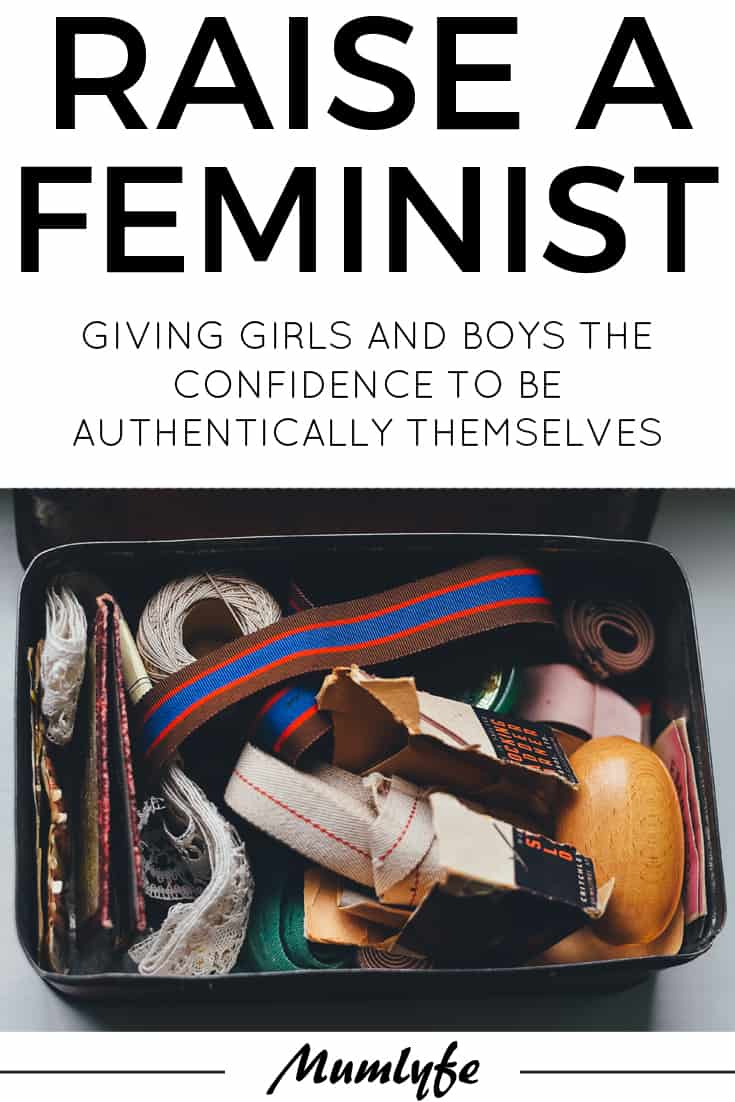“How to raise a feminist” seems like a silly topic to discuss in 2018. But I’m well aware that not every kid is lucky enough to be raised feminist.
Max, who is 13, was loving being in an all-boys class for Design Tech at school. But not for the reasons you might think.
A week or so into the class he said to me, “I’m really glad their aren’t any girls in my tech class, Mum.”
“It must make a nice change to just have the boys,” I conceded.
“It’s not that, it’s just that I’m glad the girls aren’t there to hear how the boys talk about them.”
Your heart just sinks a little, doesn’t it?
“Don’t worry,” he reassured me. “I’m never part of those conversations. I just stay quiet.”
So I said to him, one day when you’re ready, and probably not today, but soon I hope, you won’t feel like staying quiet anymore. Instead you will stand up to those boys and say, “Girls don’t deserve to be talked about like that. You’re way out of line and you need to stop right now.”
“Maybe not today…” Max agreed. But I could tell that he was imagining some future version of himself, gallantly defending the rights of girls in the face of scorn from fellow boys.
Maybe not today, but soon.
Being a feminist mum isn’t just about raising girls to be who they want and do what they like. It’s raising boys to be exactly that way too.
A couple of years back, the Nigerian writer, Chimamanda Ngozi Adichie, published Dear Ijeawele, a new 15-step manifesto on how to raise a feminist child. There was so much in her letter to her friend that made sense to me, but some things that didn’t. You can read a summary of her letter here or buy her fabulous book here.
Today, in honour of International Women’s Day, I thought I would paraphrase the points that resonated the most with me and showcase what I think it means to raise a feminist.
1. Be a person, not just a mother
We should not define ourselves solely by our mothering efforts. We need to demonstrate what it is to be a woman of the world. And, beyond that, what it means to simply be human.
2. Let the father do the fathering
This is perhaps more relevant when our children are small, but there are still plenty of mums of older kids who don’t let their partner take the lead. Perhaps children of divorced parents who co-parent can actually get more of a balanced upbringing in this way. Either way, together or separately, allow your children’s father to do things his way some of the time.
3. Kick gender roles to the kerb
I have often caught myself being more lenient on my son when it comes to household tasks. It’s because my girls are more willing helpers, but it’s not doing my son (or his future partner) any favours. In our household, we all pitch in together and it’s really only laziness (looking at you, son) that adds inequality.
4. Grow your child’s love of books
When we learn to escape into words, we learn new ways of doing things, new thoughts, new ideas, new worlds. Every child can benefit from discovering that the way we do things around here isn’t necessarily the only way.
5. Teach your kids to question everyday things
Inequality is buried deep in our language and in our rituals. So deep sometimes we don’t even realise that it’s there. Raise a seeker who questions the norm with curiosity and an open heart.
6. Talk about sex with easygoing candor
The sex thing can be tricky to negotiate with our boys and girls, but learning how to express our sexuality with respect and freedom should start from very young. Discuss important things like being assertive, true and sure. Ensure that the meaning of the word consent is crystal clear.
7. Encourage friendship between boys and girls
This is a tough one during the late primary years, but before and after that, kids are surprisingly open to opposite-sex friendships. Getting to know a friend is easily the most fun way to learn that stereotypes are stupid.
8. Make diversity the hub of life
There is richness in weaving together the pattern of difference that our lives are surrounded by. Immerse your kids in new cultures, food, people, places and dialogues. Eventually difference will become common place. It will become an expected bounty.
9. Accept that gender norms may be your child’s norm too
Feminists can be fairy princesses or superheroes. A feminist girl can love pink, being quiet and ballet dancing. A feminist boy can love rugby, video games and wrestling. It’s more important to be true to yourself than worry about what you’re supposed to be like. Which brings me to my final point…
10. Know that being authentic is more important than being liked
It is only when we are our true selves that we find the confidence to live by our values and question what we don’t understand. Delve deep with your children about what they like and don’t like. What they want more and less of. What they value the most. Being strong about what we stand for allows us to stand strong.
How will you raise a feminist?
Image by Annie Spratt


